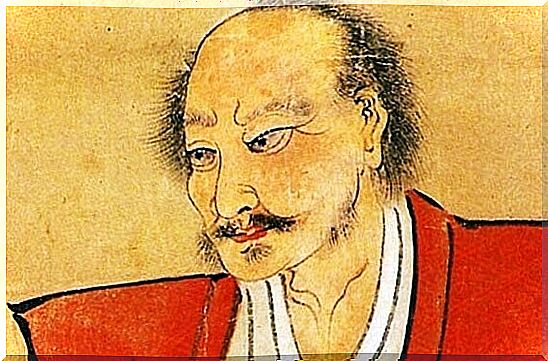The 10 Precepts Of Miyamoto Mushashi

Miyamoto Mushashi is a legendary samurai warrior from the feudal era in Japan. He is the author of the very famous work The Book of the Five Rings . He is also known for compiling a list of precepts two weeks before his death.
As a good eastern warrior, fighting for Miyamoto was much more than a battle. The samurai attached great importance to personal development. That was exactly what you needed to become a good warrior. Miyamoto’s precepts have stood the test of time, as have all the classics. They reflect the wisdom of those who have lived with bravery and acted for noble causes. We have summarized the relevant regulations in ten lines, which we will explain here.
1. Acceptance, the first of the precepts
The first of the precepts is to accept life itself as it is. Acceptance is not the same as resignation, but humility. Life is what it is and our attitude depends on ourselves: we must learn from the circumstances that we have not chosen, but that we have to live with.
The consequence of not accepting reality is uninterrupted suffering. That gives rise to an inner battle that you will always lose. Through acceptance, on the other hand, you can learn a lesson from any situation.
2. Think little about yourself and a lot about others
Those who think too much about themselves eventually get confused. You build a wall around you and you feed your insecurities. More than thinking about yourself, you should allow yourself to simply be.
True happiness lies in serving others. There is nothing like the pleasure of doing good. He who is generous shows that he is also powerful. After all, that is what allows us to appreciate ourselves.

3. Learn to let go of the desire
Desire, understood as craving for that which one does not have, only leads to eternal dissatisfaction. Having it is like a bottomless pit. The more you have, the more you desire. And it’s getting harder and harder to be satisfied.
Miyamoto, like many other Orientals, struggled to eradicate desire. He who desires a lot, is very frustrated. The real power is in our ability to let go. He who needs little is happy with little.
4. Avoid giving repentance a chance
Repentance causes much suffering. The worst part is that it’s a useless feeling. This is how Miyamoto-san shows it in his precepts. He emphasizes that we should not see a mistake as a punishment, but rather as a feature of our nature.
We can learn something from everything we do. And everything changes us in one way or another. If you have acted badly, you can learn a great lesson from it. Therefore, no event in our lives is to be disregarded. The most important thing is to learn from everything, to enrich our lives with experiences.
5. Eliminate Complaints and Resentments
Complaints only help to surround someone with bad energy. And to torment those around you. It doesn’t make any sense, because instead of taking action, it doesn’t get you anywhere.
According to Miyamoto ‘s precepts , complaints and resentment poison the one who has these feelings. They are useless. In fact, they start to destroy other positive feelings as a kind of plague.

6. Get rid of items you don’t need
Objects influence our emotions and the way we look at life. If we get too attached to them, they will eventually take control of us. They make our conscience less free.
This applies in particular to the things that we no longer need and which we nevertheless keep. They will make us more insecure and inflexible. That is why the precepts insist on getting rid of all that is useless.
7. Don’t blindly follow the beliefs of others
He is actually talking about maintaining our confidence in our own judgment. Trust your own common sense. Respect your own beliefs and your own values. Otherwise you will become very manipulable.
No one needs to hear what is right or wrong. We all have the capacity to determine this for ourselves. Blindly following others will only lead us to betray ourselves at some point.
8. Always keep your sense of honor
Honor is an almost forgotten word. It has to do with self-love. By not allowing us to engage in behavior that is inconsistent with the values we stand for, in which we believe. Those values could form a kind of compass, pointing to pride if respected despite the presence of temptations.
Honor is the most precious possession of every human being. One who is honorable inspires respect and prestige. It attracts goodwill and consideration from others, even from enemies. In this way honor can give value to life, a value that is very profound and personal.

9. Love should not be dominated by affection
Emotions are generally impulsive reactions. If you reason about it, it becomes feelings. These are deeper and more deliberate. They are related to values and not to needs.
Love is an extraordinary feeling. But sometimes we call something love which is really a blind and transient love. This happens when love is motivated by our sense of it, or by affection. In those cases, it does more damage than it does good.
10. Don’t be afraid of death
The fact is, we are mortal. Life ends and that is a natural phenomenon. We should not fear our own death or that of the people we love. In this way we can overcome the fear of death and enjoy life intensely.
Miyamoto’s precepts have survived for the great wisdom they bring and also for everything they inspire. They appeal to realism, humility and inner peace. They want us to focus on the essential, not the apparent and superficial.









